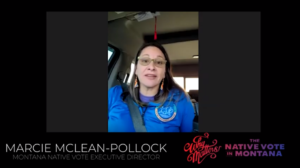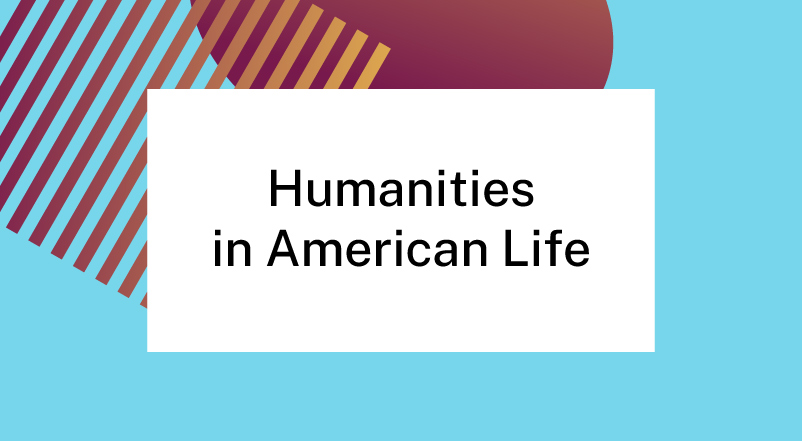“Beyond Just Voting”: The Native Vote in Montana
by Sydney Boyd, Humanities in American Life project manager
“Keep in mind that we were the first ones here, the last ones to get the right to vote, we were the last ones to become citizens,” said Marcie McLean, Montana Native Vote executive director, in a March 3 Humanities Montana virtual conversation about Native American disenfranchisement and civic participation.
McLean was referring to the Snyder Act of 1924, which recognized Native Americans born in the U.S. as full U.S. citizens, but it did not guarantee them the right to vote—the Constitution left that up to individual states. McLean noted that it wasn’t until the 1965 Voting Rights Act that all Native Americans secured their right to vote.
 Third in a four-part virtual series on civic engagement, “Why it Matters: The Native Vote in Montana” explored the history of Native voting rights and voter suppression alongside advocacy and engagement. U.S. Staff Sergeant and Crow Reservation organizer Lauri Dawn Kindness and University of Montana Professor Jason Begay joined McLean in a conversation moderated by Amy Martin, journalist and Threshold podcast producer. The series is supported by the “Why it Matters: Civic and Electoral Participation” initiative, which is administered by the Federation of State Humanities Councils and funded by the Andrew W. Mellon Foundation.
Third in a four-part virtual series on civic engagement, “Why it Matters: The Native Vote in Montana” explored the history of Native voting rights and voter suppression alongside advocacy and engagement. U.S. Staff Sergeant and Crow Reservation organizer Lauri Dawn Kindness and University of Montana Professor Jason Begay joined McLean in a conversation moderated by Amy Martin, journalist and Threshold podcast producer. The series is supported by the “Why it Matters: Civic and Electoral Participation” initiative, which is administered by the Federation of State Humanities Councils and funded by the Andrew W. Mellon Foundation.
Panelists described how historical mistrust of government entities and outsiders feeds a general lack of understanding about the connections between state, federal, and Tribal policy. Begay pointed out that Native Americans tend to be very liberal at the polls but conservative in practice, a complexity that requires attention and study because of their historically political isolation.
“Especially if you grew up in Indian country on a reservation, it’s really easy to feel insular,” Begay said. “I remember growing up on Navajo Nation feeling like everything else was just nonsense, everything outside the Navajo Nation border was like, kind of foreign, literally foreign…and it took a while, like, well into my twenties, to realize that we’re all part of this really big political ecosystem.”
From access and representation to restricted polling on reservations and limited ballot delivery, there have been—and continue to be—obstacles to Native civic engagement, panelists explained, which has, in turn, inspired action. In November, Kindness organized what she called a “drive-through pop-up site” for voter registration. On one day, she recalls visiting with 145 cars.
“We were able to register a lot of Tribal members, and…that’s when I started thinking, ‘Ok, we have to bring this to the people, we can’t expect them to…seek it out, we have to go to the people,’ so we started going and rotating through all six different districts on our reservation,” Kindness said. “We continued on all the way until election day.”
Kindness said that she helped with “every issue imaginable” during this period and highlighted complications specific to Native communities, like the fact that most people who live on reservations use PO boxes and that reservations are rural communities, making address issues common and mail-in ballots essential.
In addition to demographic breakdowns, partisanship, and polarized political issues on reservations, panelists also talked about how poverty, addiction, and the pandemic impact Native communities and civic participation.
“During the election was when the pandemic was peaking in our Tribal Nations. We were losing family members, the Northern Cheyenne Nation I think it was right around that time that they lost like at least one person a day for 18 days” McLean said. She stressed “…how hard Natives—people living in those precincts—have to work to ensure their ballot was cast.”
When someone is trying to decide between putting $20 on a card or buying diapers—in basic survival mode, McLean said—voting may not seem essential, but it matters more than ever.
“When we’re in those situations, voting is the last thing I’m going to have a conversation about, right?” McLean said. “Always remember to think beyond just voting, think about who we are—we’re human beings, we have a history and a past, and we want to have equal access to opportunity just like everybody else.”
This post is part of “Humanities in American Life,” an initiative to increase awareness of the importance and use of the humanities in everyday American life.
Photo credit: Humanities Montana



